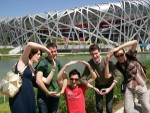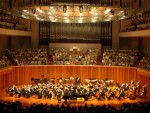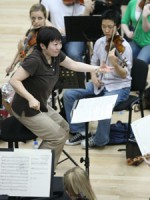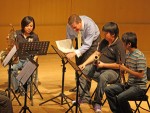Title
When I first arrived at Juilliard to start my master’s degree in September 2007, there was a buzz around the School, and I’m not talking about the construction. Something big was in the works, and during the first orchestra meeting of the year, the staff announced that the Juilliard Orchestra was planning a tour to China at the end of the school year. Capitalizing on the international spotlight on Beijing created by the (then) upcoming 2008 Olympic Games, the Chinese Ministry of Culture organized a Cultural Olympiad, which would welcome hundreds of performing arts organizations from around the world. From May 26 to June 6 we would have the opportunity to showcase the School’s talent while reaching out as cultural ambassadors. What perfect timing, I thought, for me and for Juilliard!
In front of the "Bird’s Nest" Olympic Stadium in Beijing, Juilliard Orchestra members (left to right) Emily Brausa, Michael Roest, Jeremiah Duarte Bills, Nicholas Stovall, and Ross Snyder form a human version of the Olympics trademark symbol.
The Juilliard Orchestra performing at the National Center for the Performing Arts in Beijing.
(Photo by Yangbo)Zhang Xian, associate conductor of the New York Philharmonic, rehearsing the Juilliard Orchestra for its Beijing performances.
(Photo by Yangbo)Juilliard President Joseph W. Polisi giving a master class at Beijing's Central Conservatory of Music
(Photo by Yangbo)Body
Even with the expert knowledge of tour manager Joanna Trebelhorn, who has extensive experience managing overseas tours for orchestras such as the Chicago Symphony, there were a handful of last-minute difficulties. “Increased security, given the Olympics, made it more challenging for us to get visas,” said Trebelhorn. Our hotel in Beijing also changed at the last minute. But perhaps the biggest change was the loss of James DePreist as conductor for the tour due to illness. Thanks to the outstanding efforts of resident conductor George Stelluto, who prepared the orchestra and conducted the commencement concert at the last minute, preparations for the tour proceeded smoothly.
The search for a new conductor yielded an auspicious result. Zhang Xian, associate conductor of the New York Philharmonic, graciously agreed to step in. “She is a dynamo,” said Dean Ara Guzelimian to the students before the tour. “She has high energy and musical integrity.” These qualities could not have rung more true, as she immediately captured the attention of the orchestra during our final preparatory rehearsals. Not only was Ms. Zhang a perfect fit for the orchestra, she is also a graduate of the Central Conservatory of Music in Beijing, and would be sharing the stage with her former conducting professor, Yu Feng, for the “Concert of Friendship” with the Central Conservatory Orchestra and the Juilliard Orchestra. Patrick Posey, director of orchestral activities and planning, was also excited about the appointment. “She’s a good cultural ambassador for both sides,” he said, “and she’ll bring a lot of attention to the tour. She’s the best possible solution for all parties.”
With a conductor on board and the orchestra prepared, we were finally ready for takeoff. Large instruments and concert attire were packed into flight cases and wardrobe trunks and shipped off to China on a cargo plane two days before we all left New York. Joe Tucker, a stagehand from the Chicago Symphony, joined Trebelhorn in accompanying the orchestra as cargo supervisor to make sure everything was transported properly and no instruments were damaged. After a 13-hour plane ride over the North Pole, we arrived in Beijing, as did our instruments, all in one piece and eagerly anticipating the next 10 days in China.
Arriving at our hotel, the Westin Beijing, we quickly settled into our rooms and, while some people headed to the hotel pool and others crashed on their beds, many of us decided to explore the city. My roommate Arthur Moeller (better known as R.T.) and I spent the rest of the day walking around Beijing, which sprawls out for miles. Our hotel was located in the western part of the city in the financial district, so we started out walking east in the direction of the Forbidden City and Tiananmen Square. Turning north, we took some smaller streets that showed the grittier, poorer side of the city that hadn’t benefitted from the exposure that the Olympics were bringing. Preparation for the games has played a huge part in reconciling the modernizing forces with those that are outdated, and there is new construction everywhere—but how far these changes will permeate into the impoverished areas is hard to tell. The tourist areas are clean and well-maintained, but most of the areas we walked through were old, run-down, and dirty. One narrow street was lined with food stalls and one-room convenience stores. The street food looked authentic and appetizing, but I decided that the first day of the tour probably wasn’t a good time to start experimenting with unknown foods. We made our way to a restaurant near Qianhai Lake that was listed in my guide book, with good regional cuisine and English menus—a safe bet for our first meal in China. The restaurant was tucked away down a series of winding alleys off the main street; most of the restaurants and bars in this area were hip and colorful, definitely catering to young Beijingers and 20-something tourists.
Our second day in Beijing was completely free, so the staff organized a trip to the Great Wall. We went to the Mutianyu section, which is about a 90-minute drive from the city. The mountains were beautiful, the scenery literally breathtaking (the haze from the smog and dust obstructed much of the mountains), and the strenuous hike along the wall in the hot sun was tiring. The wall is built along the crest of the mountains; it dips and peaks with the contour of the terrain, making much of the climb challenging, but worthwhile for the views and experience. And in case you were wondering: no, you cannot see the Great Wall from outer space.
Our Beijing concerts took place at the new National Center for the Performing Arts. Designed by French architect Paul Andreu, who also designed the Charles de Gaulle International Airport in Paris, the center is an enormous titanium and glass dome that incorporates an opera house, concert hall, and theater. The building is surrounded by a man-made lake 10 centimeters deep. Construction on the building began in 2001, and it opened to the public in December 2007.
The program for our first concert featured 13-year-old Juilliard Pre-College pianist Conrad Tao in Prokofiev’s Piano Concerto No. 3 and also included Berlioz’s Symphonie fantastique. We opened the program with Barber’s Adagio for Strings as a solemn tribute to the victims of the recent earthquakes in Sichuan province. Following the Adagio were three minutes of silence—the loudest and most awkward three minutes of silence I have ever experienced! The ushers began letting in latecomers as soon as the Barber was finished, and the noise of people trying to find their seats, coupled with the murmuring of the audience, created an audible buzz before even one minute had elapsed. Eventually things settled down and the concert proceeded. Those members of the tour with knowledge of Chinese concert etiquette warned us that the audience would be more reserved than we were used to, but we received applause after every movement. While our Chinese presenters were concerned that our repertoire not be too progressive (hence the Beethoven, Brahms, and Berlioz), the audience seemed to enjoy the Prokofiev. And if the music didn’t quite resonate with their expectations, they certainly couldn’t help but be awed by Conrad’s stellar performance. (We later brought this program to Shanghai with the addition of a Rachmaninoff aria sung by Juilliard bass-baritone Shen Yang.) The concert came to a rousing close with two encores, Bernstein’s Candide Overture and Bizet’s Farandole, both taken (and successfully navigated) at breakneck speed.
Our second concert went about the same as the first, but it also served to highlight something important. The piece that opened the second program, Ge Xu (Antiphony), was written by Chen Yi, a prominent Chinese-American female composer. To have two important Chinese women featured in such a prestigious spotlight, especially in a culture that favors bearing male children, sent a positive message.
One of the most popular activities among the tour members was shopping at the Silk Market, a multilevel shopping center packed with stalls selling everything from Chinese paintings and handicrafts to silks, pearls, and “designer” handbags, all ridiculously cheap—even custom-tailored dresses, suits and shirts. Aggressive saleswomen go so far as to grab you by the arm and follow you down the aisle. Haggling for the best price is mandatory, as the initial price quoted is at least 10 times the value of the item, but with cheapskate instincts and a firm resolve, a shopper can come away with amazing bargains. Thoroughly exhausted, students arrived back at the hotel like big game hunters returning from a kill, boasting about their haggling prowess and proudly showing off their acquisitions.
Our third concert in Beijing was a “Concert of Friendship” in partnership with the Central Conservatory (see sidebar). I missed out on this, however, because I left Beijing a day early, along with several other students, to fly to Shanghai in preparation for a chamber music concert at the Shanghai Conservatory. The chamber music concert provided an opportunity to present another facet of the music-making experience at Juilliard. It also was a gesture of cooperation and goodwill that helped to forge a new connection between the two institutions. On his visit to Shanghai in November 2007, Juilliard President Joseph Polisi signed an agreement with the director of the Shanghai Conservatory calling for cooperation and support in the future. While not holding any specific legal weight, it is a symbol of the strong bonds Juilliard hopes to make as a result of the tour. Like Juilliard, the Shanghai Conservatory campus is currently undergoing major renovations, so we felt right at home.
The chamber music concert consisted of two ensembles and a solo performer. Flutist Emi Ferguson, oboist Nicholas Stovall, clarinetist Moran Katz, and bassoonist Ben Moermond performed Elliott Carter’s Eight Etudes and a Fantasy for woodwind quartet, Scritto in Vento for solo flute, and Gra for solo clarinet. Conrad Tao performed Liszt’s Spanish Rhapsody and two of Rachmaninoff’s Moments Musicaux. The final piece on the program was Ravel’s String Quartet, performed by violinist Arianna Warsaw-Fan, violist Geoffrey Hamlyn, cellist Emily Brausa, and me (the second violin).
The evening’s concert was preceded by a reception at which the Shanghai Conservatory’s president, Yang Liqing, and faculty welcomed the performers and administrators from Juilliard and invoked the November agreement as a sign of friendship and progress. President Polisi also said a few words and thanked the members of the conservatory for their warm welcome. In an exchange of gifts, President Polisi presented the conservatory with copies of the scores to our program, and Yang Liqing presented us with copies of a concerto he had written for erhu (Chinese violin) and orchestra. Programming works of Elliott Carter on this concert was an attempt to bring new American music to an otherwise conservative Chinese audience, so it came as a felicitous surprise that one of the Shanghai Conservatory’s youngest professors had written his doctoral thesis on Carter! He agreed to speak briefly before the concert, and the audience received the works with enthusiasm. The performances that evening went off superbly.
The audiences in Shanghai appeared to be more enthusiastic than in Beijing, mostly because the classical music scene in this city is more vibrant and established. But according to Maestro Zhang, on the whole, the Chinese people “loved our concerts. And some gave the comments that they felt that the Juilliard Orchestra played with more warmth and enthusiasm, so the performances were more passionate than other visiting top professional orchestras in the world.” Shanghai is very much a Westernized city, making great strides to modernize and embrace a free-market system. Skyscrapers abound, and more spring up each year. One can find restaurants serving food from every corner of the globe, and there is even a pedestrian street lined with huge lighted billboards and gigantic TV screens, like a Chinese Times Square.
One clear example of the region’s economic success is the town of Suzhou, where the orchestra gave a concert at the brand-new Science and Cultural Arts Center. Suzhou, which has long been a charming and relaxing getaway from bustling Shanghai, is now a resort community with lots of brand new development, including an International Expo Center, condominium complexes, and the Science and Cultural Arts Center, which houses not only a concert hall, but a dinner theater, Cineplex, and Imax theaters.
Our concerts in Shanghai were the best of the tour. (The Shanghai segment of the tour was made possible by generous support from Citigroup.) The Shanghai Grand Theater has excellent acoustics, and we could tell that the audience was much more tuned in to the performance than in Beijing. Their applause was not polite, as we had expected, but fervent and rousing. Some performers had graduated just a few days before the tour began, and our final concert in Shanghai was the last they would play as members of the Juilliard Orchestra. I couldn’t think of a more exciting way to go out.
On the last evening of the tour, Juilliard threw a party to celebrate the tremendous efforts of all the students and staff who made the tour a huge success. Sharing her thoughts on the experience, Ms. Zhang said, “I did expect the Juilliard Orchestra to be the best student orchestra in the world. It was proved true. I was inspired by the eagerness and the talent level of the players. And I enjoyed working with Juilliard deans and staff members. I found them wonderful human beings who really care a great deal about their students.” Speeches were made and thank-you gifts presented, and everyone was slowly blinded by the continuous barrage of camera flashes as friends eagerly recorded the last of their happy memories.
Those memories will leave a lasting impression on everyone who took part in the tour. One of my personal favorites is meeting local strangers outside of a museum in Shanghai. They asked where I was from, and when I told them about the Juilliard tour, they were excited. They wanted to know what instrument I play, how long I’ve been playing, and whether I play Mozart and Beethoven. Their knowledge of Western classical music was limited, but they were so enthusiastic about it and impressed by what all of us at Juilliard are doing. One of the guys told me his name was King Kong (or at least that’s what he goes by in English). At the end of our conversation they invited me to have tea with them in a nearby café, an offer I would have readily accepted had I not been on my way to a rehearsal. To me, this encounter proved the success of Juilliard’s China tour. Our music allows us to connect a thousand people at once, and it also gives us the opportunity to make friends one-on-one. “It’s about people to people,” as President Polisi put it at the beginning of the tour. China was ready to welcome New York. Now the question remains, is the world ready for China?









